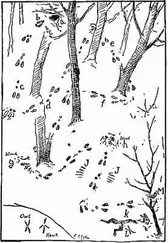Ernest Seton - Rolf in the Woods
Здесь есть возможность читать онлайн «Ernest Seton - Rolf in the Woods» весь текст электронной книги совершенно бесплатно (целиком полную версию без сокращений). В некоторых случаях можно слушать аудио, скачать через торрент в формате fb2 и присутствует краткое содержание. Год выпуска: 1997, Жанр: Приключения про индейцев, Исторические приключения, на английском языке. Описание произведения, (предисловие) а так же отзывы посетителей доступны на портале библиотеки ЛибКат.
- Название:Rolf in the Woods
- Автор:
- Жанр:
- Год:1997
- ISBN:нет данных
- Рейтинг книги:3 / 5. Голосов: 1
-
Избранное:Добавить в избранное
- Отзывы:
-
Ваша оценка:
- 60
- 1
- 2
- 3
- 4
- 5
Rolf in the Woods: краткое содержание, описание и аннотация
Предлагаем к чтению аннотацию, описание, краткое содержание или предисловие (зависит от того, что написал сам автор книги «Rolf in the Woods»). Если вы не нашли необходимую информацию о книге — напишите в комментариях, мы постараемся отыскать её.
Rolf in the Woods — читать онлайн бесплатно полную книгу (весь текст) целиком
Ниже представлен текст книги, разбитый по страницам. Система сохранения места последней прочитанной страницы, позволяет с удобством читать онлайн бесплатно книгу «Rolf in the Woods», без необходимости каждый раз заново искать на чём Вы остановились. Поставьте закладку, и сможете в любой момент перейти на страницу, на которой закончили чтение.
Интервал:
Закладка:
The captain opened his bag and showed first his instructions given before he left Ogdensburg four days ago; he bared his arm and showed a tattooed U. S. A., a relic of Academy days, then his linen marked J. F., and a signet ring with similar initials, and last the great packet of papers addressed to General Hampton. Then he said: "When you hand over your despatches to me I will give mine to you and we shall have good guarantee each of the other."
Rolf rose, produced his bundle of papers, and exchanged them for those held by Forsyth; each felt that the other was safe. They soon grew friendly, and Rolf heard of some stirring doings on the lake and preparations for a great campaign in the spring.
After half an hour the tall, handsome captain left them and strode away, a picture of manly vigour. Three hours later they were preparing their evening meal when Skookum gave notice of a stranger approaching. This was time of war; Rolf held his rifle ready, and a moment later in burst the young man who had been Captain Forsyth's driver.
His face was white; blood dripped from his left arm, and in his other hand was the despatch bag. He glanced keenly at Rolf. "Are you General Hampton's scout?" Rolf nodded and showed the badge on his breast. "Captain Forsyth sent this back," he gasped. "His last words were, 'Burn the despatches rather than let the British get them.' They got him—a foraging party—there was a spy at the hotel. I got away, but my tracks are easy to follow unless it drifts. Don't wait."
Poor boy, his arm was broken, but he carried out the dead officer's command, then left them to seek for relief in the settlement.
Night was near, but Rolf broke camp at once and started eastward with the double packet. He did not know it then, but learned afterward that these despatches made clear the weakness of Oswego, Rochester, and Sackett's Harbour, their urgent need of help, and gave the whole plan for an American counter attack on Montreal. But he knew they were valuable, and they must at once be taken to General Hampton.
It was rough, hard going in the thick woods and swamps away from the river, for he did not dare take the ice route now, but they pushed on for three hours, then, in the gloom, made a miserable camp in a cedar swamp.
At dawn they were off again. To their disgust the weather now was dead calm; there was no drift to hide their tracks; the trail was as plain as a highway wherever they went. They came to a beaten road, followed that for half a mile, then struck off on the true line. But they had no idea that they were followed until, after an hour of travel, the sun came up and on a far distant slope, full two miles away, they saw a thin black line of many spots, at least a dozen British soldiers in pursuit.
The enemy was on snowshoes, and without baggage evidently, for they travelled fast. Rolf and Quonab burdened with the sled were making a losing race. But they pushed on as fast as possible—toiling and sweating at that precious load. Rolf was pondering whether the time had not yet come to stop and burn the packet, when, glancing back from a high ridge that gave an outlook, he glimpsed a row of heads that dropped behind some rocks half a mile away, and a scheme came into his mind. He marched boldly across the twenty feet opening that was in the enemy's view, dropped behind the spruce thickets, called Quonab to follow, ran around the thicket, and again crossed the open view. So he and Quonab continued for five minutes, as fast as they could go, knowing perfectly well that they were watched. Round and round that bush they went, sometimes close together, carrying the guns, sometimes dragging the sled, sometimes with blankets on their shoulders, sometimes with a short bag or even a large cake of snow on their backs. They did everything they could to vary the scene, and before five minutes the British officer in charge had counted fifty-six armed Americans marching in single file up the bank with ample stores, accompanied by five yellow dogs. Had Skookum been allowed to carry out his ideas, there would have been fifty or sixty yellow dogs, so thoroughly did he enter into the spirit of the game.
The track gave no hint of such a troop, but of course not, how could it? since the toboggan left all smooth after they had passed, or maybe this was a reinforcement arriving. What could he do with his ten men against fifty of the enemy? He thanked his stars that he had so cleverly evaded the trap, and without further attempt to gauge the enemy's strength, he turned and made all possible haste back to the shelter of Ogdensburg.
Chapter 71.
Sackett's Harbour
It was hours before Rolf was sure that he had stopped the pursuit, and the thing that finally set his mind at rest was the rising wind that soon was a raging and drifting snow storm. "Oh, blessed storm!" he said in his heart, as he marked all trail disappear within a few seconds of its being made. And he thought: "How I cursed the wind that held me back—really from being made prisoner. How vexed I was at that ducking in the river, that really saved my despatches from the enemy. How thankful I am now for the storm that a little while back seemed so bitterly cruel."
That forenoon they struck the big bend of the river and now did not hesitate to use the easy travel on the ice as far as Rensselaer Falls, where, having got their bearings from a settler, they struck across the country through the storm, and at night were encamped some forty miles from Ogdensburg.
Marvellously few signs of game had they seen in this hard trip; everything that could hide away was avoiding the weather. But in a cedar bottom land near Cranberry Lake they found a "yard" that seemed to be the winter home of hundreds of deer. It extended two or three miles one way a half a mile the other; in spite of the deep snow this was nearly all in beaten paths. The scouts saw at least fifty deer in going through, so, of course, had no difficulty in selecting a young buck for table use.
The going from there on was of little interest. It was the same old daily battle with the frost, but less rigorous than before, for now the cold winds were behind, and on the 27th of February, nine days after leaving, they trotted into Ticonderoga and reported at the commandant's headquarters.
The general was still digging entrenchments and threatening to annihilate all Canada. But the contents of the despatches gave him new topics for thought and speech. The part he must play in the proposed descent on Montreal was flattering, but it made the Ticonderoga entrenchments ridiculous.
For three days Rolf was kept cutting wood, then he went with despatches to Albany.
Many minor labours, from hog-killing to stable-cleaning and trenching, varied the month of March. Then came the uncertain time of April when it was neither canoeing nor snow-shoeing and all communication from the north was cut off.
But May, great, glorious May came on, with its inspiring airs and livening influence. Canoes were afloat, the woods were brown beneath and gold above.
Rolf felt like a young stag in his strength. He was spoiling for a run and volunteered eagerly to carry despatches to Sackett's Harbour. He would go alone, for now one blanket was sufficient bed, and a couple of pounds of dry meat was enough food for each day. A small hatchet would be useful, but his rifle seemed too heavy to carry; as he halted in doubt, a junior officer offered him a pistol instead, and he gladly stuck it in his belt.
Taller than ever, considerably over six feet now, somewhat lanky, but supple of joint and square of shoulder, he strode with the easy stride of a strong traveller. His colour was up, his blue-gray eyes ablaze as he took the long trail in a crow line across country for Sackett's Harbour. The sentry saluted, and the officer of the day, struck by his figure and his glowing face as much as by the nature of his errand, stopped to shake hands and say, "Well, good luck, Kittering, and may you bring us better news than the last two times."
Читать дальшеИнтервал:
Закладка:
Похожие книги на «Rolf in the Woods»
Представляем Вашему вниманию похожие книги на «Rolf in the Woods» списком для выбора. Мы отобрали схожую по названию и смыслу литературу в надежде предоставить читателям больше вариантов отыскать новые, интересные, ещё непрочитанные произведения.
Обсуждение, отзывы о книге «Rolf in the Woods» и просто собственные мнения читателей. Оставьте ваши комментарии, напишите, что Вы думаете о произведении, его смысле или главных героях. Укажите что конкретно понравилось, а что нет, и почему Вы так считаете.




